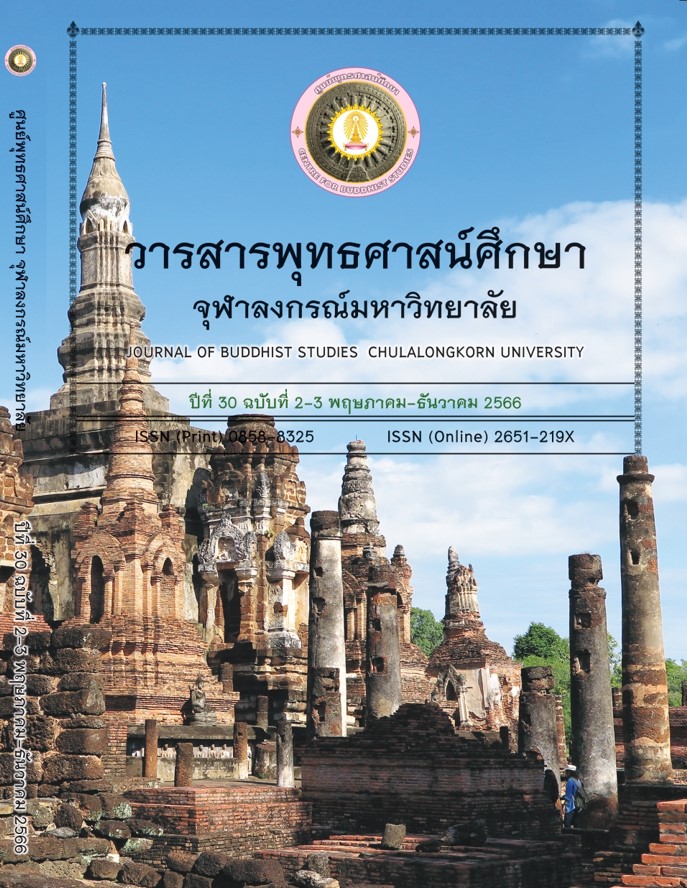“Heaven and Hell are in the Mind” From the Buddhist Canon to Explanation by Somdet Phra Buddhaghosacariya (P.A.Payutto)
Keywords:
P.A.Payutto, Hell, Heaven, Explanation, MindAbstract
The article aims to survey the concept of hell and heaven as explained by Somdet Phra Buddhaghosacariya (P.A.Payutto) in works and lectures and analyze the explanation. It is the documentary research of the publications. It is found that, in his view, hell and heaven are not the subject for a direct reference to Buddhist scripture. There should be some points to consider and treat the subject, which is significantly related to Kalamasutta, Buddha’s teaching about discretion. He categorizes the concept into 3 levels: 1) hell and heaven as cited from the Pali canon, the planes of existence in Buddhist cosmology where the result of bad and good deeds appears after death; 2) hell and heaven as the qualities of mind, which the beings in hell and heaven normally have; 3) hell and heaven as the unsatisfying and satisfying feelings, which the beings normally perceive. He emphasizes the concept of hell and heaven in the second and third level, which human can experience and perceive. Having experienced and perceived suffering and happiness from the hell and the heaven, one should realize their role in creating the good or bad results. Hell and heaven perceived with mind and perceptions is regarded as the new explanation from the physical or cosmological one to the mental qualities that relates to the doctrine of Karma. It can also widely and conveniently be communicated to the senses of feeling and reasoning of the people nowadays.
Downloads
References
กระทรวงศึกษาธิการ. สํานักงานสภาสถาบันราชภัฏ. (2538). ป.อ. ปยุตฺโต (พิมพ์ครั้ง ที่ 2). กรุงเทพฯ : บริษัทสหธรรมิก จํากัด.
บุญมี เมธางกูร และ วรรณสิทธิ์ ไวทยะเสวี. (2535). คู่มือการศึกษาพระอภิธัมมัตถ สังคหะ ปริเฉทที่ 2 เจตสิกปรมัตถ์. นครปฐม : อภิธรรมมูลนิธิ.
พร รัตนสุวรรณ. (2539). นรก-สวรรค์ (ภาคสวรรค์) (พิมพ์ครั้งที่ 2). กรุงเทพฯ: โรงพิมพ์วิญญาณ.
พนิตา อังจันทรเพ็ญ. (2547). วิถีแห่งปราชญ์ ฉบับสมบูรณ์. กรุงเทพฯ: ธรรมสภา.
พระธรรมโกศาจารย์ (พุทธทาสภิกขุ). (2549). สวรรค์ในทุกอิริยาบท. นนทบุรี: สํานักพิมพ์อนัญญา. บริษัท คิน ออเทอร์ จํากัด.
พระธรรมปิฎก (ป.อ. ปยุตฺโต). (2544). กรณีเงื่อนงํา : พระพุทธเจ้าปรินิพพานด้วย โรคอะไร? (พิมพ์ครั้งที่ 3). กรุงเทพฯ : บริษัทพิมพ์สวย จํากัด.
พระพรหมคุณาภรณ์ (ป.อ.ปยุตฺโต). (2554). พระไตรปิฎก สิ่งที่ชาวพุทธต้องรู้. (พิมพ์ครั้งที่ 15). กรุงเทพฯ: สํานักพิมพ์จันทร์เพ็ญ.
พระพรหมคุณาภรณ์ (ป.อ.ปยุตฺโต) (2556). พัฒนาสังคมไทย ด้วยความรู้เข้าใจ ไตรภูมิ ฉบับ 2 พากษ์ ไทย-อังกฤษ. กรุงเทพฯ: มูลนิธิพุทธธรรม.
พระพรหมคุณาภรณ์ (ป.อ.ปยุตฺโต) (2556). พุทธศาสนาในฐานะเป็นรากฐาน ของวิทยาศาสตร์ (พิมพ์ครั้งที่ 11). กรุงเทพฯ : สํานักพิมพ์ผลิธัมม์.
พระพรหมคุณาภรณ์ (ป.อ.ปยุตฺโต). (2557). มหาจุฬาฯ งามสง่าสดชื่น กลางทะเล แห่งคลื่นลม. กรุงเทพฯ: สํานักพิมพ์ผลิธัมม์.
พระพรหมคุณาภรณ์ (ป.อ.ปยุตฺโต). (2557). สมาธิแบบพุทธ (พิมพ์ครั้งที่ 22). กรุงเทพฯ: สํานักพิมพ์ผลิธัมม์.
พระมหาสมจินต์ สมฺมาปญฺโญ. (2533). นรกและสวรรค์ในพระพุทธศาสนาเถรวาท (วิทยานิพนธ์ปริญญามหาบัณฑิต, มหาวิทยาลัยมหาจุฬาลงกรณราช วิทยาลัย).
พระไพศาล วิสาโล. (2542). พระธรรมปิฎกกับอนาคตของพุทธศาสนา. กรุงเทพฯ: บริษัทธรรมสาร จํากัด.
พุทธทาสภิกฺขุ. (ม.ป.ป.). ภาษาคน-ภาษาธรรม. นนทบุรี: ศูนย์สืบอายุพระพุทธ ศาสนา วัดชลประทานรังสฤษฏ์.
มหาจุฬาลงกรณราชวิทยาลัย. (2539). พระไตรปิฎกภาษาไทย ฉบับมหาจุฬาลงกรณ ราชวิทยาลัย เล่ม 18, 20. กรุงเทพฯ: โรงพิมพ์มหาจุฬาลงกรณราช วิทยาลัย.
รามิล กาญจันดา. (2547). การศึกษาวิเคราะห์หลักความเชื่อในกาลามสูตร. วารสารพุทธศาสตร์ศึกษา, ปีที่ 11 (ฉบับที่ 2), จุฬาลงกรณ์มหาวิทยาลัย.
วัดญาณเวศกวัน. (2564). หนังสือธรรมะ. สืบค้นจาก https://www.watnyanaves.net/th/dhamma_books
ส.ศิวรักษ์. (2542). ธรรมกายฟางเส้นสุดท้ายแห่งความเสื่อมสลายของสถาบัน สงฆ์ไทย. กรุงเทพฯ : บริษัท ธรรมสาร จํากัด.
สมชาย เชิดกลาง. (ม.ป.ป). สวรรค์ในอกนรกในใจ. [ม.ป.ท.]. [ม.ป.พ.].
สมเด็จพระพุทธโฆษาจารย์ (ป.อ.ปยุตฺโต). (2560). นรก-สวรรค์ ในพระไตรปิฎก (พิมพ์ครั้งที่ 25). กรุงเทพฯ : สํานักพิมพ์ผลิธัมม์.
สมเด็จพระพุทธโฆษาจารย์ (ป.อ.ปยุตฺโต). (2561). พจนานุกรมพุทธศาสตร์ ฉบับ ประมวลธรรม (พิมพ์ครั้งที่ 41). กรุงเทพฯ : สํานักพิมพ์ผลิธัมม์.
สมเด็จพระพุทธโฆษาจารย์ (ป.อ.ปยุตฺโต). (2561). พจนานุกรมพุทธศาสน์ ฉบับประมวลศัพท์ (พิมพ์ครั้งที่ 31). กรุงเทพฯ : บริษัทสหธรรมิก จํากัด.
สมเด็จพระพุทธโฆษาจารย์ (ป.อ.ปยุตฺโต). (2563). พระผู้ทําสงฆ์ให้งาม. กรุงเทพฯ: บริษัทสหธรรมิก จํากัด.
สมเด็จพระพุทธโฆษาจารย์ (ป.อ. ปยุตฺโต). (2564). พุทธธรรมฉบับปรับขยาย (พิมพ์ครั้งที่ 55). นครปฐม : วัดญาณเวศกวัน. สุนทร พลามินทร์,
ชุติมา ธนะปุระ. (2538). นานาทัศนะเกี่ยวกับพระธรรมปิฎก (ประยุทธ์ ปยุตฺโต). บริษัทสหธรรมิก จํากัด.
สุภาพรรณ ณ บางช้าง. (2535) ขนมธรรมเนียมประเพณี : ความเชื่อและแนวการ ปฏิบัติ ในสมัยสุโขทัยถึงสมัยอยุธยาตอนกลาง. กรุงเทพ: โครงการเผยแพร่ ผลงานวิจัย ฝ่ายวิจัย จุฬาลงกรณ์มหาวิทยาลัย).
สุรพศ ทวีศักดิ์. (17 กันยายน 2554). พระพรหมคุณาภรณ์ (ป.อ. ปยุตฺโต) กับ วัฒนธรรมการวิจารณ์ในพุทธศาสนาเถรวาท. ประชาไท, สืบค้นจาก https://prachatai.com/journal/2011/09/36962
สุนิสา วงศ์ราม และ ปาริชาต แสงหิรัญ. (2551). พ่อสอนลูก. [ม.ป.ท.]. [ม.ป.พ.]. อาภา จันทรสกุล. (2538). ชีวประวัติพระธรรมปิฎก (ประยุทธ์ ปยุตฺโต). กรุงเทพฯ: บริษัทสหธรรมิก จํากัด.
Downloads
Published
How to Cite
Issue
Section
License
Copyright (c) 2024 Chulalongkorn University Centre for Buddhist Studies

This work is licensed under a Creative Commons Attribution-NonCommercial-NoDerivatives 4.0 International License.
บทความที่ได้รับการตีพิมพ์เป็นลิขสิทธิ์ของศูนย์พุทธศาสน์ จุฬาลงกรณ์มหาวิทยาลัย
ข้อความที่ปรากฏในบทความแต่ละเรื่องในวารสารวิชาการเล่มนี้เป็นความคิดเห็นส่วนตัวของผู้เขียนแต่ละท่านไม่เกี่ยวข้องกับศูนย์พุทธศาสน์ จุฬาลงกรณ์มหาวิทยาลัย และคณาจารย์ท่านอื่นๆในมหาวิทยาลัยฯ แต่อย่างใด ความรับผิดชอบองค์ประกอบทั้งหมดของบทความแต่ละเรื่องเป็นของผู้เขียนแต่ละท่าน หากมีความผิดพลาดใดๆ ผู้เขียนแต่ละท่านจะรับผิดชอบบทความของตนเองแต่ผู้เดียว






